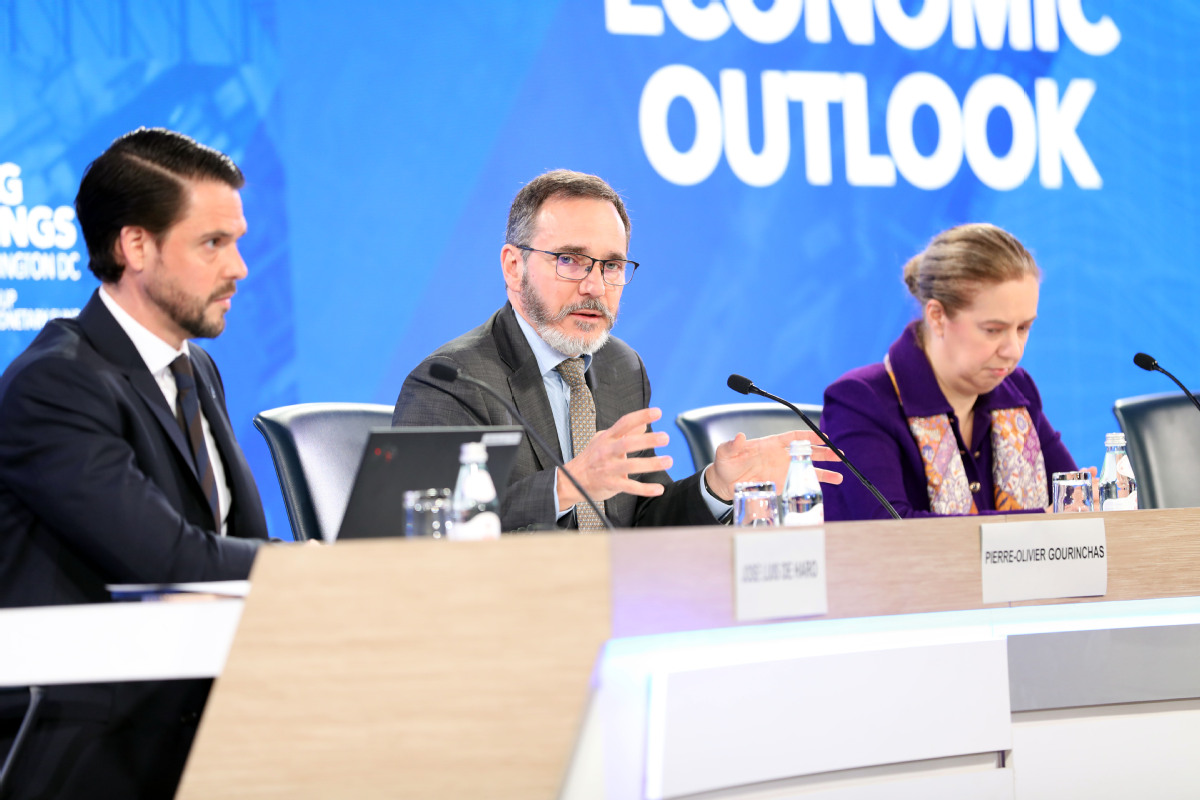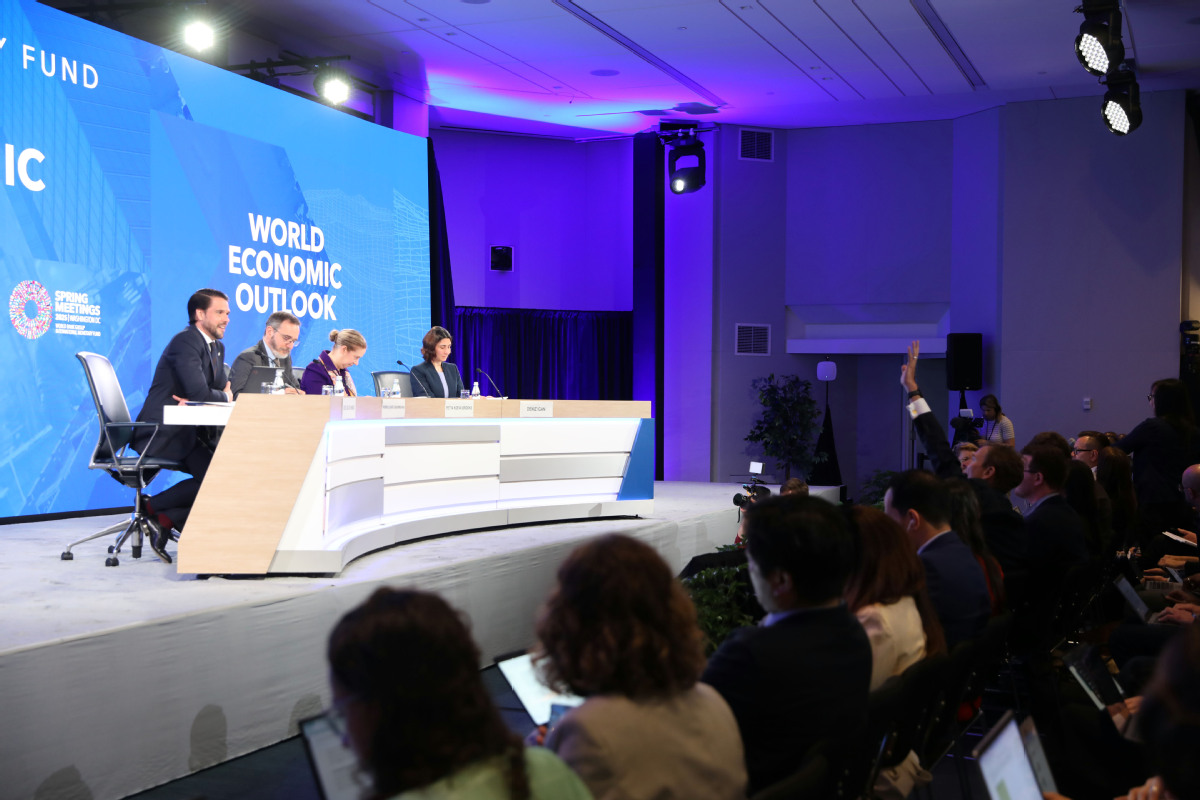IMF: Trade tensions, policy uncertainty weighing on economic prospects

Growth projections for the global and United States economies this year have declined, respectively, by 0.5 and 0.9 percentage point from January projections, due to trade tensions and policy uncertainty, the International Monetary Fund said on Tuesday. It added, however, that growth prospects could improve "immediately" if countries ease tariffs and pursue trade deals.
The latest "World Economic Outlook" report, released at the start of the IMF/World Bank Spring Meetings, said that rising trade tensions and heightened policy uncertainty are weighing heavily on global economic growth prospects, marking a potential turning point for the world economy.
ALSO READ: Global ripple effect of sweeping US tariffs: uncertainty, instability
It said that tariff increases announced between Feb 1 and April 4 by the US, and retaliatory measures from other countries, have triggered a downgrade in forecasts for global growth, which is projected to drop to 2.8 percent in 2025 and 3 percent in 2026, both below its previous projections of 3.3 percent, and also far below the average 3.7 percent growth rate for the world economy between 2000 and 2019.
The report makes clear that these downward revisions stem largely from the recent trade actions.
The negative effects are particularly visible in global trade flows, which are expected to dip more than output to 1.7 percent in 2025, a significant downward revision from the IMF's January projections.
Impact of tariff hikes
"The US' effective tariff rate surged past levels reached during the Great Depression, while counter-responses from major trading partners significantly pushed up the global rate," Pierre-Olivier Gourinchas, the IMF's chief economist, wrote in a blog published on Tuesday.
"If sustained, this abrupt increase in tariffs and attendant uncertainty will significantly slow global growth," he added.
The US economy, which is already experiencing softening demand, is now expected to grow just 1.8 percent this year, or 0.9 percentage point below earlier forecasts, and nearly half of that downgrade is directly attributable to new tariffs, according to the IMF report.
Inflation in the US is also expected to climb, reaching 3 percent, up from 2 percent previously, it said.
READ MORE: IMF: Trade tensions can lead to stock market crashes
"The idea of using tariffs to 'make America great again' will likely lead to the opposite result," said Justin Yifu Lin, former chief economist of the World Bank and dean of the Institute of New Structural Economics at Peking University.
US tariff policies are intended to protect industries in which the US does not have comparative advantages. Even if the US could bolster these industries, they would "require protection and subsidies to survive", Lin said.
Meanwhile, other countries are likely to impose similar retaliatory tariff policies in response, which will result in a shrinking export market for US high-tech industries — the very sectors where the US holds comparative advantages — and thus weaken US technological leadership, Lin added.

Projection disparity
China's growth forecast has been cut to 4 percent for this year, a 0.6 percentage point reduction, with inflation revised down by 0.8 percentage point, according to the IMF report.
Data from the National Bureau of Statistics showed that China's economy expanded 5.4 percent year-on-year in the first quarter of 2025, beating market expectations and marking a good start for the year amid headwinds.
Asked to comment on the projection disparity, Gourinchas said the IMF's number does not incorporate the latest release for the first quarter — figures that came after it made the projections. "So this is not reflected there, and we will have to see how it affects our projections when we have our next round of (World Economic Outlook) updates," Gourinchas told China Daily on Tuesday at a news briefing at the IMF Headquarters.
ALSO READ: IMF official says Asia clearly the powerhouse of global economy
Lin, from Peking University, said that given the ever-changing nature of the US tariff policies, it is very difficult to predict how they will affect China's economic growth rate.
"China, as a major economy that prioritizes domestic circulation as the main engine of growth, is well-positioned to achieve its expected growth target of around 5 percent this year by effectively leveraging its advantages and policy tools," he added.
Looking ahead, the IMF expects intensifying downside risks to dominate the outlook.
"Ratcheting up a trade war, along with even more elevated trade policy uncertainty, could further reduce near- and long-term growth, while eroded policy buffers weaken resilience to future shocks," the global lending agency said in its report.
In his blog, Gourinchas cautioned that the broader risks are mounting, as escalating trade tensions could further depress growth, and financial conditions could tighten further as markets react negatively to the diminished growth prospects and increased uncertainty.
However, there is a clear path to recovery, according to Gourinchas.
"Growth prospects could ... immediately improve if countries ease their current trade policy stance and forge new trade agreements," he wrote.
READ MORE: OECD: Global GDP growth projected to slow down to 3.1% in 2025
Noting that the global economy is at a critical juncture, the IMF proposed policy recommendations that call for prudence and improved collaboration.
"The first priority should be to restore trade policy stability and forge mutually beneficial arrangements," it said. "Reducing policy-induced uncertainty and resolving trade tensions can promote a more stable environment, bolster consumption, and facilitate investment."
The IMF urged countries to work "constructively" to promote a stable and predictable trade environment, facilitate debt restructuring and address shared challenges.
Contact the writers at huanxinzhao@chinadailyusa.com


